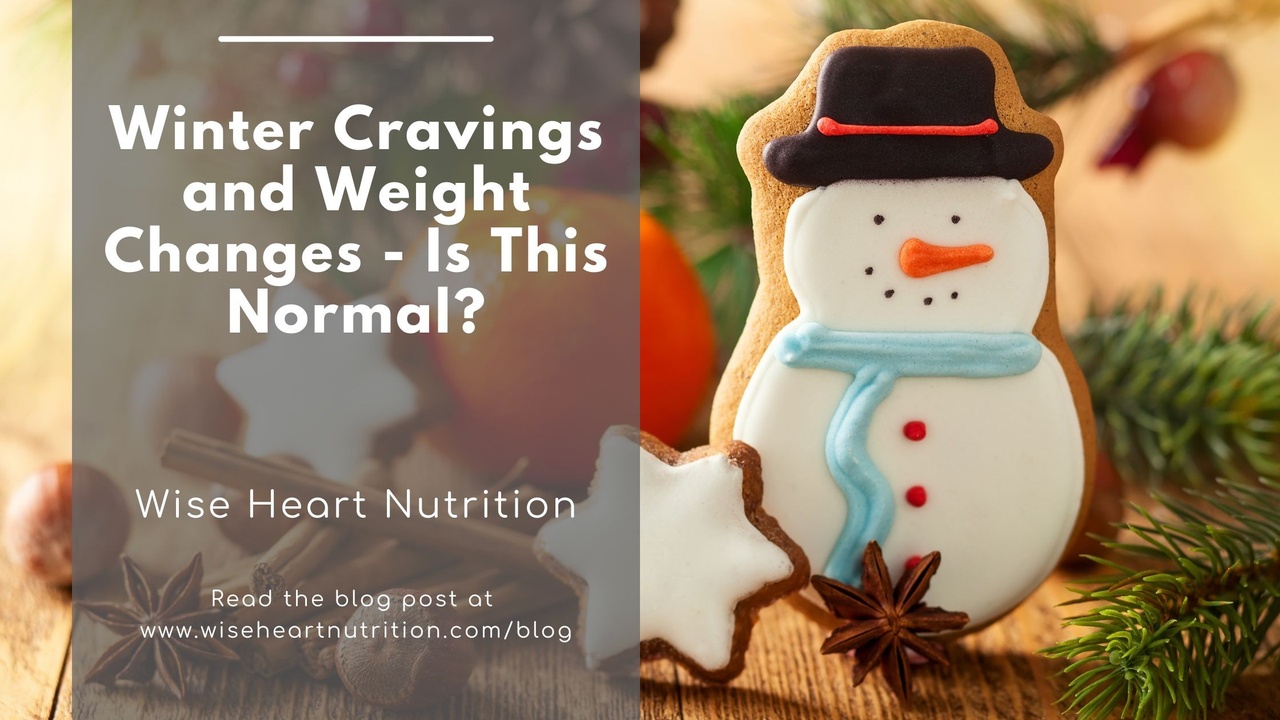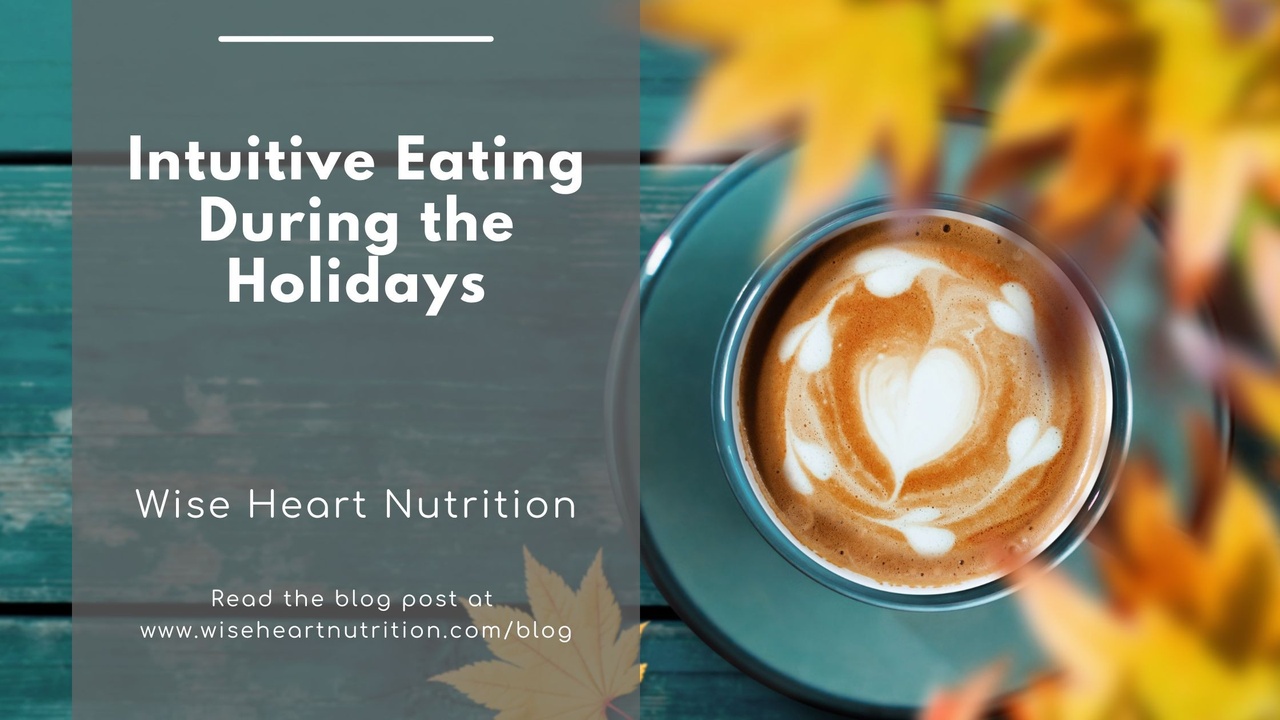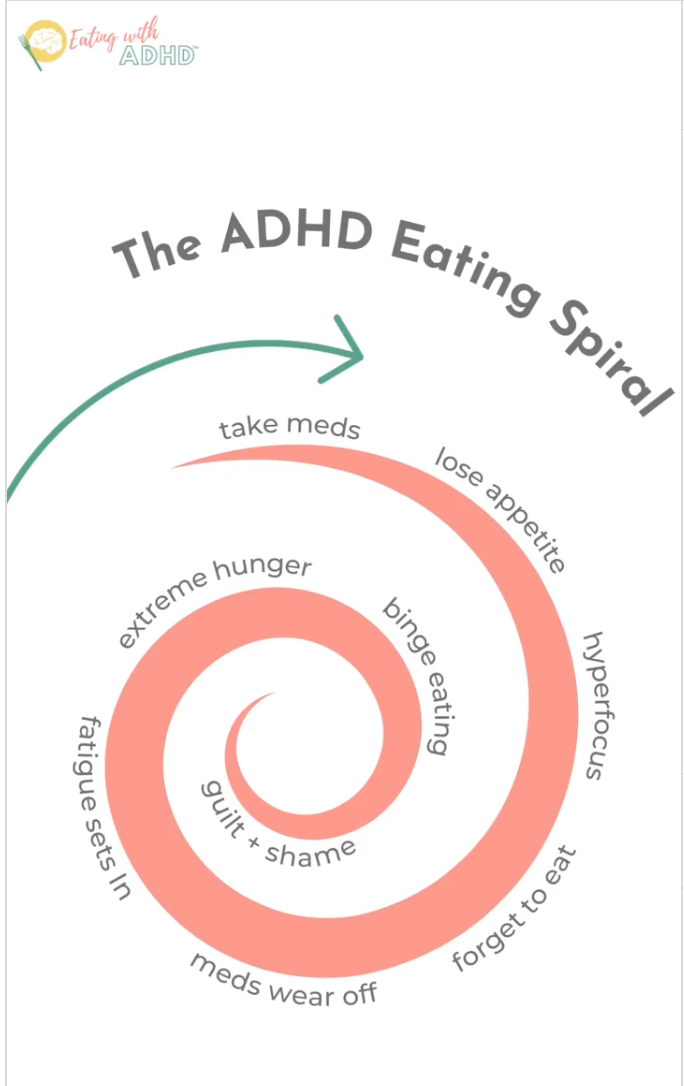Wise Heart Nutrition Blog:
All Things Anti-Diet, Intuitive Eating, and ADHD
What's the ADHD Eating Spiral and How Can I Get Out of It?

As a human who is eating with ADHD, you likely experience some *unique* patterns and habits around food and eating. Even when you do your very best to nourish yourself, you might often find yourself in a pretty sticky ADHD eating spiral.
Medicated for ADHD or not, it’s hard to snap out of hyper-focus, hard to hear and understand your special and subtle hunger cues, hard to face the steps on steps on steps it takes to get food from the kitchen to your mouth, and with an undernourished mind and body, your animal instincts can quickly become a barbaric sensation of NEED FOOD, ME HUNGRY… NOW! And thanks to diet culture, there is a steady stream of guilt, shame, and self-judgment that follows all of this.
That my friends, is what the Wise Heart team likes to call the ADHD Eating Spiral.
*click to check this post out on our the_adhd_rd Instagram!*
And for those of you that are of the unmedicated ADHD variety, this spiral has a similar loop but a different flavor to it. If you a...
5 Steps to Help You Get Started on Your Intuitive Eating Journey

So you’re here because intuitive eating sounds intriguing, but you just have no idea where to start. It’s ok - we’ve been there too! We’ve rounded up 5 actionable steps to start intuitive eating. Try 1-2 a week and call it your jump start month, or take allll the time you need. If you think about it, reading this article is already kinda the first step - so you’re killing it already!
Recognize that diet culture is harmful and weight loss is not equivalent to health
You may still be on the fence about this whole ~intuitive eating~ thing - that’s okay! The best way to get clear about what you want is to learn the facts. Unfortunately, folks are told over and over by medical professionals (including dietitians) that losing weight is necessary, when there actually isn't robust or causal research behind those recommendations. What we do know is that 95% of people who lose weight intentionally, end up gaining all or more back within 2-5 years. People end up fixating on weight and tr...
What are the Benefits of Intuitive Eating? Are there Drawbacks?

Intuitive eating has been a buzzword for quite some time now, and it's likely that you've come across various opinions and perspectives on the topic. With countless articles, blog posts, social media discussions, and even dubious spin-offs claiming the name of intuitive eating, it can be challenging to navigate the sea of information and determine the truth about its benefits and drawbacks. In this post, we'll break down the advantages and disadvantages of intuitive eating, highlighting that these factors vary depending on the individual. So, whether you're new to the concept or a seasoned pro, keep reading to learn more about this popular approach to eating.
Let's start with the good stuff and dive into the benefits of intuitive eating!
The Benefits
- A more balanced relationship with food
- Research has shown that practicing intuitive eating can lead to a more balanced relationship with food, decreased stress and anxiety around eating, and an overall more balanced plate a...
What is Healthism? And What is True Health?

What is Health?
What is health, really? Is health itself a state of being? A set of behaviors? A performance? Is health a delicate balance between an individual, genetics, and environment? What we do know, is that if you ask 10 people what health means, you’ll get 10 different answers. There are multiple realms of health - physical, emotional, social, spiritual, mental - any of which may be more important to you than another. There may even be aspects of life that are more important to you than health, like personal goals or values. And that’s the point - whatever it means, health is personal!
What is Healthism?
Now, what is healthism? The term healthism was first coined by Richard Crawford in 1980. He defined healthism as the increased pervasiveness of health to all areas of life, and the promotion of health to a super-value that allows moral judgment. He argued that health was inherently political and due to healthism, the definition of health has become so strict that risk fac...
Intuitive Eating with Diabetes, PCOS, and other Chronic Conditions

So you’ve heard about intuitive eating, but you don’t know if it’s for you because you live with a chronic health condition. There are 10 principles of intuitive eating, focusing on rejecting diet culture, finding your hunger and fullness cues, discovering satisfaction in food and movement, and gentle nutrition. While a chronic condition may pose a barrier to one or more of the principles, it is possible to start by focusing on the components that are within your ability. Read on to find out how you CAN eat intuitively with diabetes, PCOS, or any other chronic condition!
What About My Weight?
Many chronic health conditions carry the stigma that they are caused or worsened by weight, but clinical research has still failed to definitively show this to be true. Weight or BMI is not indicative of health. Those in the “overweight” or “o—-” BMI category lead just as long and healthy lives as those in the “normal” BMI category, if not longer. And of individuals with a chronic illness, t...
What Is Normal Eating? Take the Quiz!

You may have made your way to this page because you feel confused about what “normal” eating even means. You have probably endured years, or decades, of messages like “you should eat this, not that”, “that is a bad food”, and “you can have as much of this guilt-free (read: diet) food as you want”. If you have been trying desperately to lose weight by following various diets, sticking to food rules, or eating according to any kind of external plan, your hunger and fullness cues might be totally out of whack. And on top of all of this, trying to wade through the ocean of nutrition and “health” information available on the internet and social media is completely overwhelming to sort through. Whew! No wonder you’re feeling confused!
Well, you landed in the right place! We have created a normal eating quiz (guide, checklist, assessment - or whatever you want to call it) to provide you with a jumping off point for bringing more aspects of normal eating into your relationship with food...
Why and How to Make New Year's Resolutions that Aren't About Weight

Did you just see your tenth (or ten millionth) content piece about “new year, new me”? Let’s all say it together - ugh! It’s time for a new year celebration again, and with that comes all the diet industry ads and allll the pressure to make new year’s resolutions around health and body size (and just like every year, they come with that golden promise that “this time, you will make it work”!). Before you start your goal list (or don’t), can we invite you in for a little chat on why you should not make a new year’s resolution to lose weight?
Weight is not a behavior
Read that line again. Weight is not a behavior, and it’s not something you can directly control over the long term. Which means it’s not realistic to make a goal about controlling or changing weight. Research shows that there is little support for the notion that diets lead to lasting weight loss or health benefits. In fact, about 75% of weight and shape is determined by genetics, with much of the remaining percenta...
Why Does Eating For Pleasure Matter So Much?

Whether you're a newcomer to intuitive eating or a seasoned vet, pleasure in food can sometimes still feel like a dirty word. Allowing and enjoying pleasure in your eating experience goes against everything diet culture stands for, like self-control, denial of pleasure, and avoidance of "bad" foods.
The intuitive eating principles describe pleasure in food as one of the most basic and important factors in feeling satisfied or content with food. So eating for pleasure is important, and in this blog, we'll answer 4 questions about food/eating and PLEASURE.
What are some of the psychological health benefits associated with food enjoyment?
- Pleasure of any kind (including pleasure from food) leads to a release of dopamine (a neurotransmitter) in the brain. Dopamine is often referred to as the “feel good chemical” because it activates the reward pathways in the brain, which helps to promote happiness, calmness, motivation, and focus.
- Thanks to diet culture, a big part of dis...
Is it Normal for My Weight and Cravings to Change in Winter?

Daylight Saving Time has just ended (ugh), and the days are getting much shorter, much darker, and much colder. In the words of some famous show - winter is coming.
Have you ever noticed changes in your food cravings or shifts in your body weight with the seasons? Like, how a bowl of hot tomato soup and grilled cheese sounds way more appealing than watermelon and salad in the winter. Or how clothing might fit differently from summer to winter? Let’s explore why and how cravings and weight can fluctuate in the winter - and the big question, is that normal?
The general answer to that question is - yes, this is normal! We crave different foods, and our bodies may go through subtle (and even not so subtle) changes during the winter months. There are a few reasons for all of this, including (but not limited to) traditional seasonality, thermic response, and psychological shifts during this time of year.
Below, we break down these 3 explanations of how and why winter can im...
5 Tips for Maintaining a Healthy Relationship with Food During the Holidays

Spooky season is already upon us, which means the holidays are here! But, what we are told is the “most wonderful time of the year” can often feel like the most stressful time of the year. We are bombarded with events centered on food, more social commitments, being around family, and surrounded by expectations to be in a “festive mood”, spend money, and listen to non-stop holiday music. And with all of these variables (and more) contributing to stress, comes anxiety, which can manifest in our relationship with food.
I wish I could tell you that the spirit of the holiday season would magically make it easy to maintain the healthy relationship with food that you have been working towards. Wouldn’t that be nice?
Despite all this doom and gloom (it is halloween, after all), you CAN navigate the holidays, eat intuitively, AND maintain a healthy relationship with food. Here are 5 tips to thrive during the holidays and preserve the relationship you have built with food and body!...

